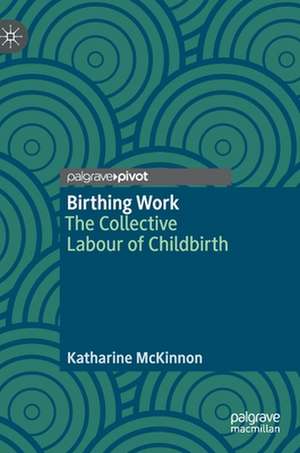Birthing Work: The Collective Labour of Childbirth
Autor Katharine McKinnonen Limba Engleză Hardback – 28 oct 2019
Preț: 418.07 lei
Nou
Puncte Express: 627
Preț estimativ în valută:
80.00€ • 85.55$ • 66.70£
80.00€ • 85.55$ • 66.70£
Carte tipărită la comandă
Livrare economică 18 aprilie-02 mai
Preluare comenzi: 021 569.72.76
Specificații
ISBN-13: 9789811500091
ISBN-10: 9811500096
Pagini: 113
Ilustrații: XI, 144 p. 1 illus.
Dimensiuni: 148 x 210 mm
Greutate: 0.34 kg
Ediția:1st ed. 2020
Editura: Springer Nature Singapore
Colecția Palgrave Pivot
Locul publicării:Singapore, Singapore
ISBN-10: 9811500096
Pagini: 113
Ilustrații: XI, 144 p. 1 illus.
Dimensiuni: 148 x 210 mm
Greutate: 0.34 kg
Ediția:1st ed. 2020
Editura: Springer Nature Singapore
Colecția Palgrave Pivot
Locul publicării:Singapore, Singapore
Cuprins
1. Introduction: Assembling Birth.- 2. Negotiating with Babies.- 3. Thinking with Bodies.- 4. Becoming Mothers Alongside a Roomful of Things.- 5. Doctoring with Bureaucracy.- 6. Loving Technologies.- 7. Taking Time.- 8. Conclusion: Caring for the Diverse Birth.
Notă biografică
Dr Katharine McKinnon is a human geographer whose work engages with community economies, gender, development and care. She holds a PhD in Human Geography from The Australian National University and her work is informed by post-development theory and feminist economic geography. She is a member of the Community Economies Collective and holds an inaugural Tracey Banivanua Mar Research Fellowship at La Trobe University, Australia.
Textul de pe ultima copertă
This book traces the assemblage that comes into being in the spaces and experiences of childbirth. Charting the contributions of the multiple human and non-human actors that contribute to the birth experience, it offers a new perspective on childbirth that cuts across the often emotional debates about natural versus medicalised birth. Drawing on ethnographic interviews with mothers, midwives and obstetricians, it provides an insight into the collective endeavours that shape birth. In doing so, it also explores who does the work of childbirth, expanding the boundaries for who (and what) is responsible for this collective labour and highlighting the interdependencies that characterise it. Structured around eight chapters that each focus on a different actor in the birth space, the volume argues that pregnancy and childbearing brings us into new relationships: with ourselves, with the child to be born, our partners and families, those who care for us, and with more-than-human others.
Caracteristici
Engages influential new theory on assemblage to explore the politically and ethically charged area of childbirth, and in doing so promises an important intervention in a falsely divided area of social life Draws the focus away from the often binarised framework of ‘the whys and hows’ of childbirth, to instead look at how taking a new materialist approach can help us think through this form of care-work in a new way Extends existing understandings of agency in the context of birth, particularly the myriad agencies of the more than human in this context
